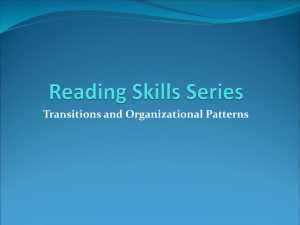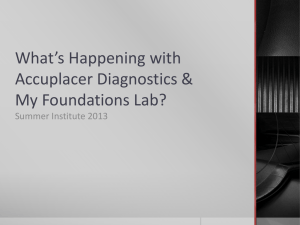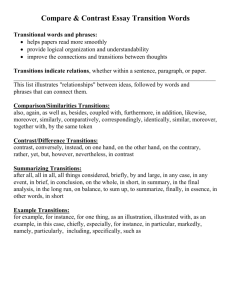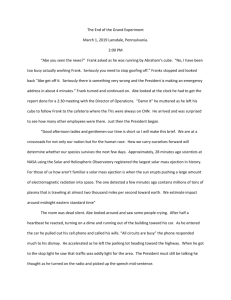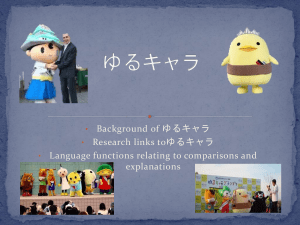2010-2011 Transitions Aid -WIA Incentive GrantRFP
advertisement
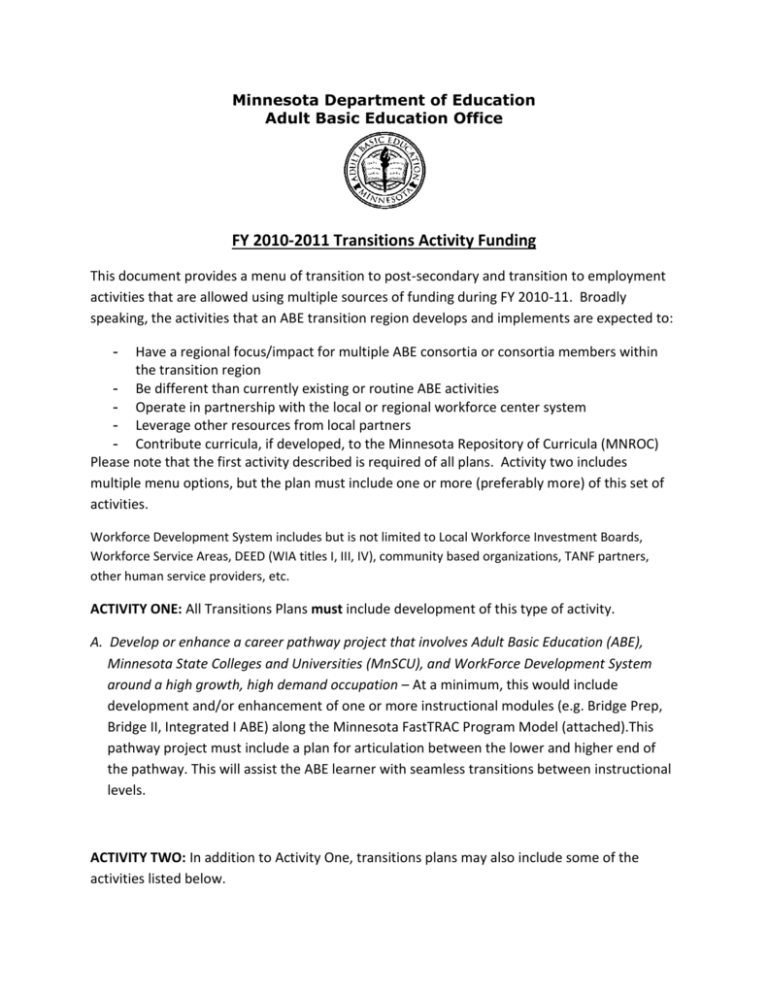
Minnesota Department of Education Adult Basic Education Office FY 2010-2011 Transitions Activity Funding This document provides a menu of transition to post-secondary and transition to employment activities that are allowed using multiple sources of funding during FY 2010-11. Broadly speaking, the activities that an ABE transition region develops and implements are expected to: Have a regional focus/impact for multiple ABE consortia or consortia members within the transition region - Be different than currently existing or routine ABE activities - Operate in partnership with the local or regional workforce center system - Leverage other resources from local partners - Contribute curricula, if developed, to the Minnesota Repository of Curricula (MNROC) Please note that the first activity described is required of all plans. Activity two includes multiple menu options, but the plan must include one or more (preferably more) of this set of activities. - Workforce Development System includes but is not limited to Local Workforce Investment Boards, Workforce Service Areas, DEED (WIA titles I, III, IV), community based organizations, TANF partners, other human service providers, etc. ACTIVITY ONE: All Transitions Plans must include development of this type of activity. A. Develop or enhance a career pathway project that involves Adult Basic Education (ABE), Minnesota State Colleges and Universities (MnSCU), and WorkForce Development System around a high growth, high demand occupation – At a minimum, this would include development and/or enhancement of one or more instructional modules (e.g. Bridge Prep, Bridge II, Integrated I ABE) along the Minnesota FastTRAC Program Model (attached).This pathway project must include a plan for articulation between the lower and higher end of the pathway. This will assist the ABE learner with seamless transitions between instructional levels. ACTIVITY TWO: In addition to Activity One, transitions plans may also include some of the activities listed below. To accomplish these activities and projects, the transition budget may be used to support extended and/or intensified RTC time (salary). Those budget decisions should be made by the ABE managers in the ABE transitions region. B. Distribution and use of Minnesota Regional Labor Market Information (LMI) regarding indemand or emerging jobs – In order for ABE providers to be able to contextualize basic skills content around high growth, high demand occupational areas, there is a significant need for communications around current local and regional labor market information. The Department of Employment and Economic Development has modified the Occupations in Demand tool to create the FastTRAC Program Planning Tool (Occupations in Demand). The tool allows a user to select, view, and download high-demand occupation data in support of adult career pathway program planning decisions. http://www.positivelyminnesota.com/apps/fastTRACpt/Default.aspx C. Increased employer involvement in regional FastTRAC programming and other career pathway or transition to employment activities – For example, ABE providers and local WorkForce Center System staff will organize and convene meetings with local employers to build support for career pathway (i.e.-FastTRAC) projects that are designed to meet the immediate employment needs of local or regional businesses. D. Development, dissemination and adoption of employability skill curricula-Many of the clients arriving at local WorkForce Center Systems lack basic employability skills as well as basic literacy. Activities will be developed to cooperatively design and deliver employability and work readiness skills to dually enrolled clients or other clients referred to ABE by WorkForce Center Systems. The curriculum should scaffold and connect across levels and across programs in the region. E. Development of work experience opportunities– Significant numbers of common ABE and workforce system clients lack credible work histories and/or vocational skills. Activities will be developed and managed cooperatively between ABE and a workforce training system to design short-term internship programs and longer term apprenticeship programs. F. Develop basic computer literacy programming – Implement computer literacy curricula for ABE programs in support of career pathway development efforts. Also, establish computer literacy programming by ABE providers and in direct collaboration with the WorkForce Development System programs and MFIP providers. Note – there will also be some funds available in early 2011 through the Blandin Foundation for this purpose. G. Develop career advising and mentoring for learners starting at the beginning levels of Adult Basic Education. H. Create/ adopt and implement instructional modules on college readiness skills and disseminate to multiple ABE sites. I. Implement career readiness preparation in collaboration with WorkForce Development System’s career readiness credentialing. J. Other projects as approved – Projects must be preapproved by the Minnesota Department of Education-Adult Basic Education. OVERVIEW OF FUNDING – see “Transitions Activity Funding” Spreadsheet Federal ABE Transitions Aid Year One of the ABE Transitions Aid from MDE-ABE will provide $20,000 to ten Transitions areas including the seven ABE Regions and the three new areas– St. Paul, Minneapolis, and the Department of Corrections (DOC). This funding is the first year of the Three-year ABE Initiative – the Next STEP (Statewide Transitions Expansion and Priority). The $20,000 is available starting July 1, 2010 – June 30, 2011. The funding is distributed through the Adult Basic Education consortium that is currently the fiscal agent for the Regional Transitions Coordinator, and to St. Paul, Minneapolis, and DOC. Workforce Investment Act (WIA) Incentive Grant The regions mentioned above will also receive $35,000 in Workforce Investment Act (WIA) Incentive grants. This funding is available from October1, 2010 through March 31, 2012. Expenditures from October 1, 2010-September 30, 2011 should reflect around $17,000. The $35,000 will be distributed through the Minnesota Workforce Council Association (MWCA) through invoices. In an attempt to simplify reporting, the two funding opportunities mentioned above will be combined into one proposal/reporting document. Each ABE area will be asked to submit a proposal that needs to be pre-approved by MDE-ABE. Once the proposal has been approved an ABE area can immediately access the $20,000 in Federal Transitions Aid and access the WIA $35,000 incentive grant. Please be aware that this report combines two different funding streams with different timelines for spending the funds and different ways to access the funding. Regional Transitions Coordinator (RTC) Funding Seven ABE transitions regions received $22,000 from the WIA Incentive Grant 2009. Those funds are available through March 2011 and should be primarily (but not exclusively) used for RTC time (salary). This funding is being distributed to the seven regions through the Minnesota Workforce Council Association (MWCA). Several regions have appreciated the important work that the Regional Transitions Coordinators complete. If a region chooses to continue the work of a Regional Transitions Coordinator then that region should budget WIA Incentive Grant funding to support a RTC’s salary going forward and /or for additional time during 2010-2011. Projected Funding Please note that the Funding for Transitions Activities excel spreadsheet includes projected funding to support work being done in the Transitions arena beyond 2012. The Minnesota Department of Education –Adult Basic Education is planning to commit funding the next two years through the Next STEP initiative. In addition, it has been projected that there might be a continuation of the WIA Incentive Grant beyond 2012. FORM DIRECTIONS Reporting for the Federal Transitions Aid and for WIA Incentive Grant 2010 will be combined. The attached template is formatted to include the proposal, interim report and the final report. FY 2010-2011 award letters for ten ABE fiscal agents include a line item aid category denoted as Federal Transition Aid. In order to receive that aid, ABE Regions, Minneapolis, Saint Paul, and the Department of Corrections must do the following: Complete and submit the attached proposal by September 30, 2010. (Please e-mail the proposal to Cherie Eichinger at cherie.eichinger@state.mn.us.); Receive proposal approval from MDE-ABE; Conduct the activities described in the proposal Submit an interim Report by July 31, 2011 Submit a final report by April 30, 2012. If you have any questions regarding this document or the template please contact: Julie Dincau ABE Transitions Specialist 651-582-8681 Julie.Dincau@state.mn.us

